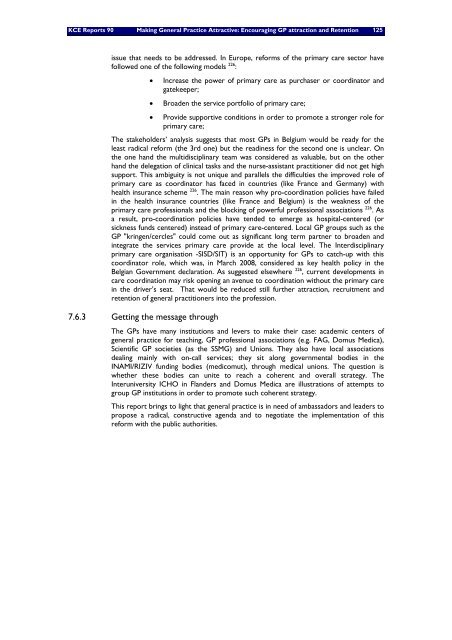Download the report (150 p.) - KCE
Download the report (150 p.) - KCE
Download the report (150 p.) - KCE
Create successful ePaper yourself
Turn your PDF publications into a flip-book with our unique Google optimized e-Paper software.
<strong>KCE</strong> Reports 90 Making General Practice Attractive: Encouraging GP attraction and Retention 125<br />
issue that needs to be addressed. In Europe, reforms of <strong>the</strong> primary care sector have<br />
followed one of <strong>the</strong> following models 226 :<br />
• Increase <strong>the</strong> power of primary care as purchaser or coordinator and<br />
gatekeeper;<br />
• Broaden <strong>the</strong> service portfolio of primary care;<br />
• Provide supportive conditions in order to promote a stronger role for<br />
primary care;<br />
The stakeholders’ analysis suggests that most GPs in Belgium would be ready for <strong>the</strong><br />
least radical reform (<strong>the</strong> 3rd one) but <strong>the</strong> readiness for <strong>the</strong> second one is unclear. On<br />
<strong>the</strong> one hand <strong>the</strong> multidisciplinary team was considered as valuable, but on <strong>the</strong> o<strong>the</strong>r<br />
hand <strong>the</strong> delegation of clinical tasks and <strong>the</strong> nurse-assistant practitioner did not get high<br />
support. This ambiguity is not unique and parallels <strong>the</strong> difficulties <strong>the</strong> improved role of<br />
primary care as coordinator has faced in countries (like France and Germany) with<br />
health insurance scheme 226 . The main reason why pro-coordination policies have failed<br />
in <strong>the</strong> health insurance countries (like France and Belgium) is <strong>the</strong> weakness of <strong>the</strong><br />
primary care professionals and <strong>the</strong> blocking of powerful professional associations 226 . As<br />
a result, pro-coordination policies have tended to emerge as hospital-centered (or<br />
sickness funds centered) instead of primary care-centered. Local GP groups such as <strong>the</strong><br />
GP "kringen/cercles" could come out as significant long term partner to broaden and<br />
integrate <strong>the</strong> services primary care provide at <strong>the</strong> local level. The Interdisciplinary<br />
primary care organisation -SISD/SIT) is an opportunity for GPs to catch-up with this<br />
coordinator role, which was, in March 2008, considered as key health policy in <strong>the</strong><br />
Belgian Government declaration. As suggested elsewhere 226 , current developments in<br />
care coordination may risk opening an avenue to coordination without <strong>the</strong> primary care<br />
in <strong>the</strong> driver’s seat. That would be reduced still fur<strong>the</strong>r attraction, recruitment and<br />
retention of general practitioners into <strong>the</strong> profession.<br />
7.6.3 Getting <strong>the</strong> message through<br />
The GPs have many institutions and levers to make <strong>the</strong>ir case: academic centers of<br />
general practice for teaching, GP professional associations (e.g. FAG, Domus Medica),<br />
Scientific GP societies (as <strong>the</strong> SSMG) and Unions. They also have local associations<br />
dealing mainly with on-call services; <strong>the</strong>y sit along governmental bodies in <strong>the</strong><br />
INAMI/RIZIV funding bodies (medicomut), through medical unions. The question is<br />
whe<strong>the</strong>r <strong>the</strong>se bodies can unite to reach a coherent and overall strategy. The<br />
Interuniversity ICHO in Flanders and Domus Medica are illustrations of attempts to<br />
group GP institutions in order to promote such coherent strategy.<br />
This <strong>report</strong> brings to light that general practice is in need of ambassadors and leaders to<br />
propose a radical, constructive agenda and to negotiate <strong>the</strong> implementation of this<br />
reform with <strong>the</strong> public authorities.
















